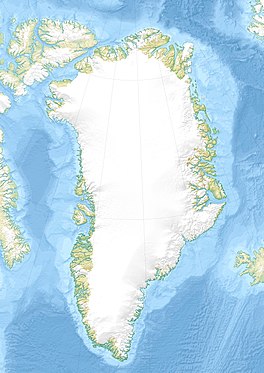Zachariae Isstrom
| Zachariae Isstrom | |
|---|---|
 1911 map with the Zachariæ Isstrøm at the bottom | |
| Type | Piedmont glacier |
| Location | Greenland |
| Coordinates | 78°0′N 30°0′W / 78.000°N 30.000°W |
| Area | 91,780 km2 (35,440 sq mi) |
| Width | 26 km |
| Terminus | Jokel Bay, Greenland Sea North Atlantic Ocean |
Zachariae Isstrom (Template:Lang-da; Isstrøm being the Danish word for ice stream) is a large glacier located in King Frederick VIII Land, northeast Greenland.
This glacier was named by the Denmark expedition 1906–08 after Georg Hugh Robert Zachariae (1850–1937), an officer of the Danish Navy.[1]
Geography
It drains an area of 91,780 km2 (35,440 sq mi) of the Greenland Ice Sheet with a flux (quantity of ice moved from the land to the sea) of 11.7 km3 (2.8 cu mi) per year, as calculated for 1996,[2] increasing to 15 km3 (3.6 cu mi) in 2015.[3] The glacier holds a 0.5-meter sea-level rise equivalent.
Zachariae Isstrøm has its terminus in the northern part of Jokel Bay, south of Lambert Land and north of Nørreland, near the Achton Friis Islands.[4] It terminates into an embayment previously packed with multi-year calf ice.[5]
Glacier retreat
Zachariae Isstrøm broke loose from a stable position in 2012 and entered a phase of accelerated retreat as predicted in 2008.[6]
From a state of approximate mass balance until 2003 it is now losing mass at about 5 Gt/yr. The ice velocity increased by 50% in 2000–2014. In 2012 it detached from a stabilizing sill and retreated rapidly along a downward-sloping, marine-based bed[3] with substantial calving[7]
See also
References
- ^ Place names, NE Greenland - GEUS
- ^ Rignot E., Kanagaratnam P. (2006). "Changes in the velocity structure of the Greenland Ice Sheet". Science. 311 (5763): 986–990. doi:10.1126/science.1121381. PMID 16484490.
- ^ a b Fast Retreat of Zachariæ Isstrøm, Northeast Greenland
- ^ "Zachariae Isstrøm". Mapcarta. Retrieved 16 June 2016.
- ^ Greenland marine-terminating glacier area changes: 2000–2010
- ^ Glacier changes for 2008 Greenland ice sheet outlet glacier front changes: comparison of year 2008 with past years
- ^ NASA Earth Observatory December 4, 2015
External links

